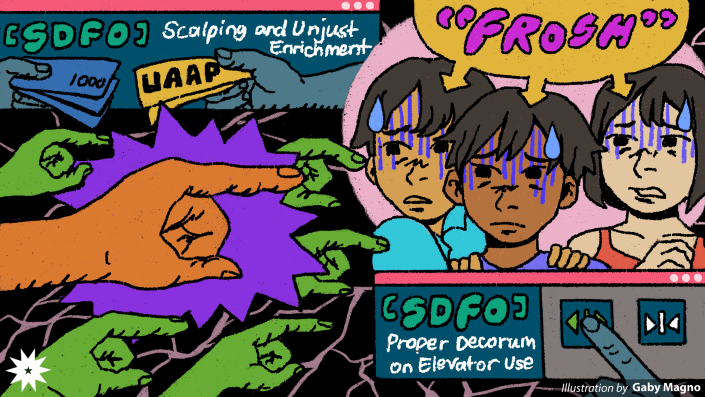Among the University’s cultural trademarks is the annual tradition of “frosh hate”, which pokes fun at the enthusiasm of freshmen toward their first collegiate year and sarcastically blames all things on them just for the fun of it. This year’s return to campus was accompanied by a welcome bash of concerns on decorum, which seems to surprise those stepping foot on campus for the first time. While the University administration has been making efforts to accompany frosh toward self-improvement, more tangible corrective measures and systems are apparently needed.

Spoon-fed manners
This frosh hate was limited to the “kasalanan ‘to ng mga frosh” banter when we were all just studying online. But with the return to campus came back the routine complaints over these newcomers blocking hallways, not observing elevator etiquette, or just overall not knowing how to properly utilize the University’s resources and spaces. The frosh believe that they should have been given guidance instead of hate, but seniors argue that “basic” manners don’t need to be spoon-fed.
(This is the frosh’s fault.)
These manners, however, have been served on a platter to Lasallians thus far. The Student Discipline Formation Office (SDFO) released 20 Help Desk Announcements (HDA) in this term alone, far more than in the previous terms. Despite the possibility that this is due to the return of on-site classes, some announcements relate to issues that pop up in the general Lasallian conversation, such as the scalping of discussion room reservations and violations of the No Eating Policy. The frequency of SDFO’s announcements suggests this year’s calls for a reassessment of Lasallian behavior.
Not an isolated case
But it would be unfair for the frosh to be singled out in this manner as everyone is addressed in these announcements. For one, Lasallians of all year levels continue to treat social media platforms as their lost-and-found booth even if the SDFO has provided a lost items tracker. Unjust enrichment—which includes not turning over items to the SDFO Lost and Found Section—is a major offense, the office reminded. A lot of students, frosh or not, have also been scalping courses. It isn’t new either to find Lasallians of all batches eating and smoking in places they should not.
It would also be unfair to treat the frosh’s manner concerns as a one-time occurrence when this has been a sentiment that has been going on for years, albeit not as noticed in the online setup. Posts from an older online forum discussed that discipline-induced frosh hate date back to 2006, when the Br. Andrew Gonzalez Hall was newly opened to house frosh students. Forum members claim that the lack of etiquette among frosh pushed for their reintegration into the main campus grounds as a way to better guide them with University rules and processes.
This only comes to show that this is all indeed an endless cycle of familiarization, which is expected of the frosh since they cannot learn all things in an instant. They would need guidance at first to find the places where they need to be. At this point of naivety, the last thing that they need is a community that genuinely hates them for being clueless.
Developing maturity
College students figuring things out in an instant would be ideal, but the reality is we all still have room to grow and improve. It is important that students and administrators alike take part in fostering a community that is formative and corrective, not spiteful and exclusive. Beyond the SDFO’s and the University Student Government’s efforts in imposing policies and maintaining discipline, we must acknowledge that we, students, also play a crucial role in the culture that thrives within our community. It would be our collective responsibility to be disciplined individuals that reflect Lasallian values and to create an environment that is conducive to learning.
Beyond interpersonal responsibilities in improving campus culture, the University’s firm and fair imposition of policies would also be of great impact. This could begin by revisiting and clarifying guidelines, such as campus dress code policies that seem to have been informally scrapped, through official announcements or the release of an updated Student Handbook. Further, the return of on-site operations calls for the SDFO, who has been active in releasing HDAs and social media posts, to increase their presence and enforce student discipline on the ground.
Most importantly, we must remember that self-improvement only progresses when we allow ourselves to undergo that process. Policies and advice would bear no meaning if no one listens to them.
